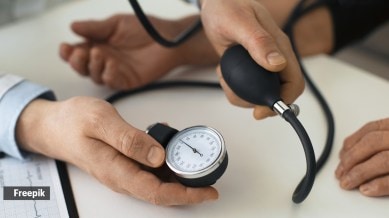📣 For more lifestyle news, click here to join our WhatsApp Channel and also follow us on Instagram
‘My blood pressure is 193/110. I went to urgent care, they reviewed stroke protocol and said I need to go to primary doctor which is weeks away. Am I in danger? I am 58’
Start by monitoring your blood pressure twice daily, once in the morning and once in the evening.

Can high blood pressure lead to stroke? That’s what a Quora user wanted to know: “My blood pressure is 193/110 mmHg. I went to urgent care and they reviewed stroke protocol and said I need to go to my primary doctor, which is weeks away. Am I in danger? I am 58”. So we turned to Dr Parin Sangoi, consultant, interventional cardiologist, Wockhardt Hospitals, Mumbai Central, who told us that even if the person feels fine, a 193/110 reading must never be ignored. “Treat it as a red flag and get timely medical evaluation. Blood pressure this high always deserves swift attention, not delay,” said Dr Sangoi.
Stressing that 193/110 mmHg is a “really high reading,” he said: “In fact, that comes under what the medics term a hypertensive crisis.”
Even if you aren’t experiencing headache, chest pain, vision changes, or breathlessness, this kind of high pressure puts intense strain on the heart, brain, kidneys, and eyes, said Dr Sangoi. “You are not in imminent danger, while tests have come back negative with no evidence of stroke or heart attack, but you shouldn’t wait weeks. Book an earlier appointment or attend an emergency department if your numbers stay high or develop any new symptoms,” said Dr Sangoi.
What should one track before meeting the doctor?
Start by monitoring your blood pressure twice daily, once in the morning and once in the evening. “Note each reading, time, and any symptoms (like dizziness or palpitations). Avoid caffeine, alcohol, and heavy salt intake for now. If you’re already on medication, make sure you’re taking it regularly; don’t skip or double doses without advice,” said Dr Sangoi.
When should you treat high blood pressure as a medical emergency?
If your BP is above 180/120 mmHg, seek immediate care for the following:
Severe headache
Chest pain or tightness
Shortness of breath
Blurred vision
Confusion or slurred speech
Weakness or numbness on one side
These may signal a hypertensive emergency when high blood pressure is damaging organs, said Dr Sangoi.
What lifestyle changes can I make until I see the doctor?
*Cut down on salt, fried, and processed foods.
*Stay well-hydrated and limit caffeine.
*Get 30 minutes of light activity daily, like walking.
*Try relaxation: deep breathing, listening to soft music, or short meditation breaks.
*Sleep well and avoid late-night stress or screen time.
DISCLAIMER: This article is based on information from the public domain and/or the experts we spoke to. Always consult your health practitioner before starting any routine.
📣 For more lifestyle news, click here to join our WhatsApp Channel and also follow us on Instagram